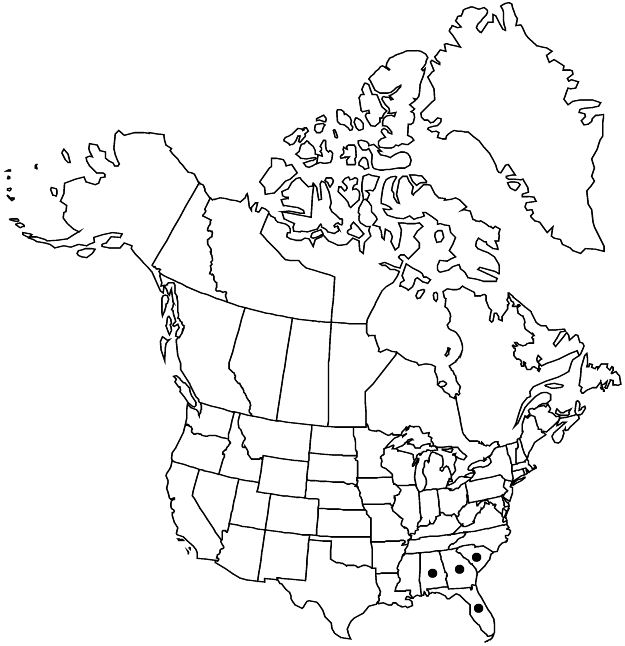Difference between revisions of "Prunus serotina var. alabamensis"
Phytologia 4: 309. 1953.
FNA>Volume Importer |
FNA>Volume Importer |
||
| Line 15: | Line 15: | ||
|name=Prunus alabamensis | |name=Prunus alabamensis | ||
|authority=C. Mohr | |authority=C. Mohr | ||
| + | |rank=species | ||
|publication_title=Bull. Torrey Bot. Club | |publication_title=Bull. Torrey Bot. Club | ||
|publication_place=26: 118. 1899 | |publication_place=26: 118. 1899 | ||
| Line 21: | Line 22: | ||
|name=Padus alabamensis | |name=Padus alabamensis | ||
|authority=(C. Mohr) Small | |authority=(C. Mohr) Small | ||
| + | |rank=species | ||
}} {{Treatment/ID/Synonym | }} {{Treatment/ID/Synonym | ||
|name=P. australis | |name=P. australis | ||
|authority=(Beadle) Beadle | |authority=(Beadle) Beadle | ||
| + | |rank=species | ||
}} {{Treatment/ID/Synonym | }} {{Treatment/ID/Synonym | ||
|name=P. cuthbertii | |name=P. cuthbertii | ||
|authority=(Small) Small | |authority=(Small) Small | ||
| + | |rank=species | ||
}} {{Treatment/ID/Synonym | }} {{Treatment/ID/Synonym | ||
|name=Prunus serotina subsp. hirsuta | |name=Prunus serotina subsp. hirsuta | ||
|authority=(Elliott) McVaugh | |authority=(Elliott) McVaugh | ||
| + | |rank=subspecies | ||
}} | }} | ||
|hierarchy=Rosaceae;Rosaceae subfam. Amygdaloideae;Rosaceae tribe Amygdaleae;Prunus;Prunus serotina;Prunus serotina var. alabamensis | |hierarchy=Rosaceae;Rosaceae subfam. Amygdaloideae;Rosaceae tribe Amygdaleae;Prunus;Prunus serotina;Prunus serotina var. alabamensis | ||
| Line 45: | Line 50: | ||
|elevation=20–700 m | |elevation=20–700 m | ||
|distribution=Ala.;Fla.;Ga.;S.C. | |distribution=Ala.;Fla.;Ga.;S.C. | ||
| − | |discussion=<p>Variety alabamensis has obovate leaf blades, much broader than < | + | |discussion=<p>Variety alabamensis has obovate leaf blades, much broader than <i></i>var.<i> serotina</i>. The apices are usually obtuse, rounded, or rounded-emarginate, sometimes short-acute or short-acuminate. Branchlets and, sometimes, raceme axes are rusty-hairy; abaxial surfaces of leaf blades have scattered, rusty hairs. The trees are said to leaf out two weeks later than <i></i>var.<i> serotina</i> and to hold their leaves much longer in the fall (C. L. Brown and L. K. Kirkman 1990).</p> |
|tables= | |tables= | ||
|references= | |references= | ||
| Line 54: | Line 59: | ||
-->{{#Taxon: | -->{{#Taxon: | ||
name=Prunus serotina var. alabamensis | name=Prunus serotina var. alabamensis | ||
| − | |||
|authority=(C. Mohr) Little | |authority=(C. Mohr) Little | ||
|rank=variety | |rank=variety | ||
| Line 69: | Line 73: | ||
|publication year=1953 | |publication year=1953 | ||
|special status=Endemic | |special status=Endemic | ||
| − | |source xml=https://jpend@bitbucket.org/aafc-mbb/fna-data-curation.git/src/ | + | |source xml=https://jpend@bitbucket.org/aafc-mbb/fna-data-curation.git/src/f50eec43f223ca0e34566be0b046453a0960e173/coarse_grained_fna_xml/V9/V9_591.xml |
|subfamily=Rosaceae subfam. Amygdaloideae | |subfamily=Rosaceae subfam. Amygdaloideae | ||
|tribe=Rosaceae tribe Amygdaleae | |tribe=Rosaceae tribe Amygdaleae | ||
Revision as of 22:42, 16 December 2019
Twigs hairy, often densely so, hairs rusty brown. Leaves: petiole 2–12 mm, hairy to glabrate, glandular at petiole-blade junction, glands 2; blade elliptic to obovate, 3–12.5 × 2–6.5 cm, ± leathery, apex usually obtuse, rounded, or emarginate, sometimes abruptly acute or short-acuminate, abaxial surface sparsely hairy, especially along midribs and proximally. Inflorescences: rachises 50–160 mm.
Phenology: Flowering Apr–May; fruiting Jun–Aug.
Habitat: Rocky slopes and ridges, sandhills, mixed oak-pine-hickory forests
Elevation: 20–700 m
Distribution

Ala., Fla., Ga., S.C.
Discussion
Variety alabamensis has obovate leaf blades, much broader than var. serotina. The apices are usually obtuse, rounded, or rounded-emarginate, sometimes short-acute or short-acuminate. Branchlets and, sometimes, raceme axes are rusty-hairy; abaxial surfaces of leaf blades have scattered, rusty hairs. The trees are said to leaf out two weeks later than var. serotina and to hold their leaves much longer in the fall (C. L. Brown and L. K. Kirkman 1990).
Selected References
None.